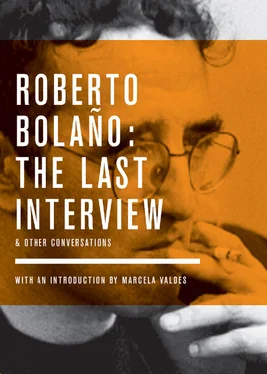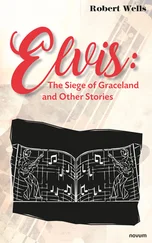EA:Do you owe your sentimental education to Mexico?
RB:More than anything I owe Mexico my intellectual education. My sentimental education? I owe that more to Spain, I think. When I came to Spain, I was twenty-three or twenty-four years old. I arrived thinking I was already a man — through and through — and that I knew everything there was to know about sex, and for me a sentimental education is almost synonymous with a sexual education. In reality, I knew nothing, which I quickly realized with the first girl I met. I knew many positions, but positions are positions and sex is sex.
EA:It’s one thing to know methodology—
RB:Exactly. My sentimental education begins at age twenty-three in Europe.
EA:Have you not wanted to return to Mexico for fear of finding a completely different country from the one you left and having lost your connection?
RB:Yes, that’s true. But it’s also true that, although I’ve traveled a lot, I don’t recognize many countries from afar, and between getting to know a new country and returning to Mexico, a country I love but which is swarmed by ghosts, among them the ghost of my dead best friend, and where I believe I would have a very bad time, I prefer to go to other places. I’ve gotten too comfortable to go around choosing to spend a bad time in a particular place. I used to love to go to places where I knew I’d have a bad time. But, now, for what?
EA:Were you an anarchist when you arrived in Spain?
RB:Yes. I found many fellow anarchists and I started to cease being one myself. How did it occur to them? What kind of anarchy was that?
EA:In Spain, the people were coming out from under a dictatorship, and they had the power.
RB:Yes. The trouble is that in Barcelona I didn’t just find Catalan people, who I found to be magnificent, but also people from everywhere in Spain and Europe and South America too. There were people who had come from all over the world, above all from the West, to understand us. One lived very well. There was work. In 1977 and ’78 there were jobs that paid very little but that allowed you to subsist. State pressures had started to relax. Spain had begun to be a democratic country and there were wide margins of liberty. For a foreigner like me, that was a gift for which I will endlessly be grateful.
EA:Did you already believe that Chilean literature revolved around Pablo Neruda?
RB:I thought that even before. The problem is that this isn’t exactly how it is. For me, Chile’s great poet is Nicanor Parra and after Nicanor Parra there are several others. Neruda is one of them, without a doubt. Neruda is what I pretended to be at age twenty: living like a poet without writing. Neruda wrote three very good books; the rest — the great majority — are very bad, some truly infected. But he already lived like a poet and not just like a poet: he performed like a sun poet, like a poet king.
EA:The thing that happened with Neruda — the type of man who appeared to be against the establishment but then lives off the state — hasn’t that happened with many Mexican writers? Let’s use Octavio Pazand Carlos Fuentesas examples.
Born in 1914, Octavio Paz is one of Mexico’s most important writers and the winner of the 1990 Nobel Prize for Literature. He has been outspoken in the realm of Mexican politics and served as the Mexican ambassador to India from 1962–1968.
One of the most prolific and outspoken writers in twentieth century Spanish language literature, Carlos Fuentes (b. 1928) was also one of the first modern Spanish language writers to garner real success in the United States. Born in Panama City, Panama, Fuentes was also steeped in the magical realism movement. His 1985 novel Gringo Viejo was adapted into a Hollywood film.
RB:It’s because in literature, the only country where this doesn’t happen, at least from what I can tell, is Argentina. What happens in Mexico happens in all of the other countries in Latin America; in Chile a little bit less but it happens there as well. In Argentina, there is a level of professionalism expected of writers and that the state tries to ignore, but in other countries it is asked of writers that they be independent yet also that they charge the state, which reminds one of a phrase from Mexico’s President Echeverría, who said, “neither to the right, nor to the left, nor in a static center, but onward and upward.” If the writer can’t ask the state for money, he gets mad and will protest the lack of help using his platform like the profoundly independent writer that he is. Besides, that type of direct help translates into all kinds of cultural advances, including jobs.
EA:Are you more on the side of the Mexicanness of Paz or the universalism of Fuentes?
RB:I think Octavio Paz is more universal. The truth is, until the moment I lived in Mexico, Fuentes and Paz were, as one would say in Spain, “a partir un piñon,” intimate friends. One was the tsar and the other the tsarevitch; they were very fond of one another. I would guess that Fuentes even loved Paz, if it’s possible for Fuentes to love someone, which is another topic; and Paz probably loved Fuentes, if Paz has ever loved anyone, which is again another topic. Evidently, I don’t side with either of them.
EA:This thing with intellectuals saying things to one another, it’s quite Mexican.
RB:It depends on what’s being said. Yes, it’s not unusual in Mexico. Intellectual life — artistic life — in Mexico is very active, as are all aspects of life in Mexico. Mexico is a tremendously vital country, despite the fact that, paradoxically, it’s the country where death is the most present. Perhaps being that vital is what keeps death so close. I feel as distant from Fuentes as I do from Paz. I recognize the writer in Paz, above all, in his essays. He is more interesting as a prose writer than Fuentes is as a prose writer. As a poet, there are four poems by Paz that I could still reread without losing interest, there’s even one I still like a lot. The truth is, in general, Mexican poetry tends toward pride, toward starchiness, although there are notable exceptions evidently. There is Mexican poetry I like very much. I like López Velardea lot, I like Tablada;among the modern writers I like Mario Santiago, who was my friend. But, look, back to your question, if I had to sit near one of them, I’d sit closer to Octavio Paz than to Fuentes.
Considered one of the fathers of modern Mexican poetry, Ramón López-Velarde (1888–1921) was beloved in his country yet garnered little attention outside its borders. Writing during the Mexican Revolution and the turmoil of the years after, he had a profound effect on a generation of Mexican writers. A collection of his work, Song of the Heart: Selected Poems by Ramon López-Velarde , is available in English.
Mexican poet, novelist, and playwright José Juan Tablada (1871–1945) left Mexico in 1914 for the United States. His polemical and satirical writings during the Mexican Revolution angered many important politicians and military officials. Choosing exile, he spent time in Texas, New York City, and Japan. He is credited with introducing the haiku to Spanish-language literature.
EA:Must we speak of Macedonioin order to speak of Borges?
RB: Pigliabelieves so; I don’t. Piglia believes that Macedonio is very important. Macedonio seems to me to be very important, but I think he is important only as measured by his proximity to Borges. In fact, Borges illuminates a ton of writers and painters. For example, Xul Solar, who, if it weren’t for Borges, would probably only be known in Argentina. Perhaps Solar’s paintings deserve only to be known in Argentina, but by being touched by Borges, through the Borgian experience, they become paintings that transcend the limits of Argentina. I think Xul was capable of seducing anyone; he was a very seductive type. And Macedonio seduces Borges perhaps by his courage. Borges is a man who loves courage, who looks for it in people and who knows how to appreciate it besides, and I believe Macedonio is one of those writers, one of the most courageous beings Borges knows. He is a man truly without duplicity. Borges knows he can always rely on Macedonio and if there were ever a moment when that wouldn’t be possible, he knows he would hear it directly from Macedonio himself. Macedonio, the Borgian Macedonio that comes to us through Borges’ prose at least, incarnates the ideal Argentine, he makes possible the impossible Argentine, the Argentine with a little Creole in him, who lives for many years in a little room, who is a Spartan in his habits, the man who is always mourning over a woman, which is something that seduces Borges, something that would seduce anyone of this era. Because it isn’t just Borges who is head over heals for Macedonio, there are a ton of writers of Borges’ generation who are awestruck by him. Borges was awestruck by those Creole things of his, because he was a Creole who left in order to speak of Schopenhauer, and speak well besides. He was of an exquisite logic. But, for me, what’s important is Borges.
Читать дальше












